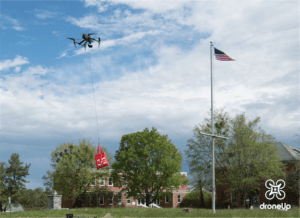UPS drone delivery took another big step forward recently. UPS partnered with leading U.S. drone service providers DroneUp, UPS subsidiary UPS Flight Forward (UPSFF), Virginia’s Center for Innovative Technology (CIT), and Workhorse Group to test drone delivery exhaustively – proving the case for drones to take a role in helping medical professionals respond to Covid-19.
UPS (NYSE:UPS) drone delivery became big news last year when the company received FAA certification to operate a drone airline, opening the door to revenue generating, commercial drone delivery. As the world’s largest package delivery company and a transportation and logistics powerhouse, UPS has the potential to scale drone delivery to homes across the country.
Having begun drone delivery operations on medical campuses, UPS was a logical leader to inform the White House – quickly – how drone delivery might be leveraged to respond to the current pandemic. With it’s robust network of trained and vetted drone pilots, DroneUp was able to respond to the call to help provide the data needed, flying for 3 days on the vacant campus of St. Paul’s College in Lawrenceville, Virginia. “DroneUp and UPS did the most extensive delivery of packages that has ever been done,” says Tom Walker, DroneUp CEO. “Hundreds, if not thousands of flights – it was an exhaustive exercise. We took a 55-acre college campus, we made it a town, and we by the end of day two we were doing deliveries every 3 minutes.”
The thousands of data points generated helped the team to evaluate issues like safe operational capacities; airspace de-confliction and operator safety policies necessary for peak optimal capacity; processes, policies and training necessary; and proposed policy changes that would further enable drone delivery.
“We’ve proven through ongoing commercial drone delivery programs that effective drone delivery of medical products is faster than conventional ground-based transportation,” said Scott Price, UPS chief strategy and transformation officer. “Drones offer a low-touch option for delivery of lab specimens and medical products that could make a significant impact in an urgent response application.”
“Data collected during this fast-paced simulation will be used to determine how private-sector drone operators can effectively supplement emergency response and certain patient care,” says a DroneUp press release. “The findings and recommendations will be included in a report to the White House, where leaders are considering what role the nascent industry could play in the Coronavirus response.”
Other participants in the tests were Virginia’s Center for Innovative Technology (CIT), a nonprofit corporation, and Workhorse Group.
“We’re proud to be able to help through the use of our drone technology and aerospace team in this crisis,” said Duane Hughes, Workhorse Group CEO. “We’ve made hundreds of autonomous drone deliveries in the National Airspace System over the last four years using our proprietary technology combined with our all-electric delivery vehicles. We have a comprehensive understanding of the benefits provided by a drone delivery when speed counts. The people of Workhorse are ready to help through these trying times in any way we can.”
“Many in the public – along with federal, state and local officials – are asking how drones can be used in this time of crisis,” said Tom Walker, DroneUp CEO. “Rather than speculate, it is incumbent upon our industry to conduct operationally-based exercises that produce factual data and lessons learned to ensure we can respond safely, effectively and efficiently when called upon. Data collected now will impact our capabilities beyond the COVID-19 outbreak we are currently facing.”
Miriam McNabb is the Editor-in-Chief of DRONELIFE and CEO of JobForDrones, a professional drone services marketplace, and a fascinated observer of the emerging drone industry and the regulatory environment for drones. Miriam has penned over 3,000 articles focused on the commercial drone space and is an international speaker and recognized figure in the industry. Miriam has a degree from the University of Chicago and over 20 years of experience in high tech sales and marketing for new technologies.
For drone industry consulting or writing, Email Miriam.
TWITTER:@spaldingbarker
Subscribe to DroneLife here.
